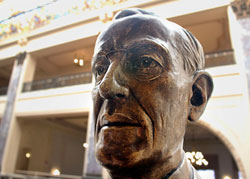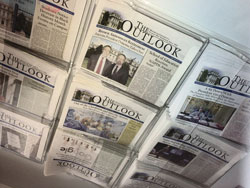Students at Princeton University managed a 32-hour protest in the university’s president’s office on Nov. 18. Demands were made to diminish the prominence of Woodrow Wilson’s legacy on the Princeton campus due to his racial attitudes and regressive policies.
Members of Princeton’s Black Justice league demanded that the name of Woodrow Wilson, the 28th U.S. president, and a segregationist, be removed from various buildings on campus. They also demanded that his mural be “scrubbed” from the dining hall.
At the University, President Paul Brown, PhD was proactive in addressing the possible issues involved in Woodrow Wilson’s legacy on campus in a memorandum he emailed to the community last Thursday, Dec. 3.
He began, “In recent weeks the conflicted legacy of a number of prominent national historic figures including Woodrow Wilson has sparked a national conversation on racial injustice. As a university we have a special responsibility for critical self-examination and leadership on these important issues,” said Brown.
Dr. Brian Greenberg, a Professor of American Social History said, “I’ve read President Brown’s email and am glad that he has opened a campus-wide discussion of Wilson and race.
“The issue is less did Wilson hold racist beliefs – he clearly did – but the act of segregating Washington that he initiated after becoming president. His racism and the policies he initiated damaged real people, cost them their jobs, and ruined their lives.”
Brown said that there will be a series of open sessions throughout the next few months to gather input from the campus community on this issue. A committee is being formed that includes Board Chair Henry Mercer, Nina Anderson, Director of the Office of Equity and Diversity, students, faculty, alumni, administrators and trustees.
Together they will engage the University in a discussion about Wilson, his legacy, and his role on campus. The first listening sessions will begin today, Dec. 9, from 12:00 to 1:30, and 2:30 to 4:30 in the Afflitto Conference Room on the third floor of the Rebecca Stafford Student Center.
Anderson asserts that presumptions cannot be made on the outcome of these open dialogues. “Ultimately, we expect that after listening to this feedback the committee will make a recommendation to the Board on the name of Wilson Hall and it will be for the Board to decide what actions may or may not be taken,” she said.
If the University community was interested in following in the footsteps of Princeton students then that may include the possible renaming of the University’s administrative building Wilson Hall.
However, some students are opposed to this idea. Mallory Inselberg, a junior political science and psychology student said, “Honestly, I don’t think that Wilson’s actions should be relevant nowadays. Wilson Hall is basically a historical landmark and to change its name now I feel would kind of be a disgrace to the University, and to all the memories, and all of the history that has come with it.”
“Princeton students have their own opinions, which we can respect and accept, but I feel like for us to do the same thing based on an issue that is not relevant now is wrong. I mean he is not here technically to defend himself, so I feel like it is a waste of time when people could be spreading awareness about other issues,” Inselberg continued.
Some students believe that the current Wilson Hall is the exact same building for which Woodrow Wilson summered during his presidency. However, according to Hettie Williams, a lecturer, on African American History from the Department of History and Anthropology this is not the case. She said, “President Wilson never lived in the current structure that is now a part of our campus as the main administration building. He summered in West Long Branch in 1916 and died in 1924. The original Shadow Lawn mansion was destroyed in a fire in 1927; and, the current structure was built in 1929. This building was not named Wilson Hall until 1966,” said Williams.
“While Wilson’s legacy is attached to the state of New Jersey and progressive reform more specifically, coupled with his role as president of Princeton University, it is less so to the actual structure that we now call Wilson Hall,” Williams continued.
Allison Goerke, a senior communication student supports the actions taken by students at Princeton. She is also open to the idea of renaming Wilson Hall if University students were interested in that idea. “I think that it is very important that our University is a climate where people feel protected and really comfortable, and if attending class in a building named after a racist president is hindering that process then maybe the school should consider changing it,” she said.
Mariah Toussaint, a senior health studies student, and a member of the African American Student Union did not know of Wilson’s regressive racism until the protests at Princeton were brought up in a club meeting. “Now that I know, I feel like everything that I stand for which is non-racism, and equality would be diminished if we upheld his legacy by keeping the hall named after him. It’s literally just a name so I think that we should change it,” she said.
Hetti asserts that Wilson Hall is not recognized as a national historical landmark due to any recorded links to Woodrow Wilson, but because of its unique construction. “This designation of national historical landmark is due to its grandiose Beau-Arts architecture coupled with the fact that the plans for the structure were drafted by America’s first classically trained African American architect Julian F. Abele who was retained by the Philadelphia architectural firm of Horace Trumbauer to develop the plans for the structure. Abele designed or assisted in the design of more than 400 buildings throughout the country including homes, mansions, and public buildings on college campuses such as Duke University, Harvard University, and Monmouth University.”
Goerke deduces that these sessions are critical for the betterment of the future. “History repeats itself. Things are happening right now that probably have happened decades or centuries ago, and I think that it is important to discuss what has happened in the past in order to see what we can fix today,” she said.
PHOTO COURTESY of Kiera Lanni




